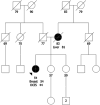Clinical interpretation of pathogenic ATM and CHEK2 variants on multigene panel tests: navigating moderate risk
- PMID: 29445900
- PMCID: PMC6092249
- DOI: 10.1007/s10689-018-0070-x
Clinical interpretation of pathogenic ATM and CHEK2 variants on multigene panel tests: navigating moderate risk
Abstract
Comprehensive genomic cancer risk assessment (GCRA) helps patients, family members, and providers make informed choices about cancer screening, surgical and chemotherapeutic risk reduction, and genetically targeted cancer therapies. The increasing availability of multigene panel tests for clinical applications allows testing of well-defined high-risk genes, as well as moderate-risk genes, for which the penetrance and spectrum of cancer risk are less well characterized. Moderate-risk genes are defined as genes that, when altered by a pathogenic variant, confer a 2 to fivefold relative risk of cancer. Two such genes included on many comprehensive cancer panels are the DNA repair genes ATM and CHEK2, best known for moderately increased risk of breast cancer development. However, the impact of screening and preventative interventions and spectrum of cancer risk beyond breast cancer associated with ATM and/or CHEK2 variants remain less well characterized. We convened a large, multidisciplinary, cross-sectional panel of GCRA clinicians to review challenging, peer-submitted cases of patients identified with ATM or CHEK2 variants. This paper summarizes the inter-professional case discussion and recommendations generated during the session, the level of concordance with respect to recommendations between the academic and community clinician participants for each case, and potential barriers to implementing recommended care in various practice settings.
Keywords: ATM; CHEK2; Cancer genetics; Genomic cancer risk assessment (GCRA); Moderate-risk gene; Panel test.
Conflict of interest statement
Figures





Similar articles
-
Breast cancer screening implications of risk modeling among female relatives of ATM and CHEK2 carriers.Cancer. 2020 Apr 15;126(8):1651-1655. doi: 10.1002/cncr.32715. Epub 2020 Jan 22. Cancer. 2020. PMID: 31967672 Free PMC article.
-
Moderate penetrance genes complicate genetic testing for breast cancer diagnosis: ATM, CHEK2, BARD1 and RAD51D.Breast. 2022 Oct;65:32-40. doi: 10.1016/j.breast.2022.06.003. Epub 2022 Jun 18. Breast. 2022. PMID: 35772246 Free PMC article. Review.
-
Cancer risk management among female BRCA1/2, PALB2, CHEK2, and ATM carriers.Breast Cancer Res Treat. 2020 Jul;182(2):421-428. doi: 10.1007/s10549-020-05699-y. Epub 2020 May 22. Breast Cancer Res Treat. 2020. PMID: 32445176
-
Comprehensive Breast Cancer Risk Assessment for CHEK2 and ATM Pathogenic Variant Carriers Incorporating a Polygenic Risk Score and the Tyrer-Cuzick Model.JCO Precis Oncol. 2021 Jun 24;5:PO.20.00484. doi: 10.1200/PO.20.00484. eCollection 2021 Jun. JCO Precis Oncol. 2021. PMID: 34322652 Free PMC article.
-
Germline CHEK2 and ATM Variants in Myeloid and Other Hematopoietic Malignancies.Curr Hematol Malig Rep. 2022 Aug;17(4):94-104. doi: 10.1007/s11899-022-00663-7. Epub 2022 Jun 8. Curr Hematol Malig Rep. 2022. PMID: 35674998 Review.
Cited by
-
Prevalence of Inherited Mutations in Breast Cancer Predisposition Genes among Women in Uganda and Cameroon.Cancer Epidemiol Biomarkers Prev. 2020 Feb;29(2):359-367. doi: 10.1158/1055-9965.EPI-19-0506. Epub 2019 Dec 23. Cancer Epidemiol Biomarkers Prev. 2020. PMID: 31871109 Free PMC article.
-
Management of individuals with germline pathogenic/likely pathogenic variants in CHEK2: A clinical practice resource of the American College of Medical Genetics and Genomics (ACMG).Genet Med. 2023 Oct;25(10):100870. doi: 10.1016/j.gim.2023.100870. Epub 2023 Jul 25. Genet Med. 2023. PMID: 37490054 Free PMC article.
-
Defining Lifetime Risk Thresholds for Breast Cancer Surgical Prevention.JAMA Oncol. 2025 Jul 24:e252203. doi: 10.1001/jamaoncol.2025.2203. Online ahead of print. JAMA Oncol. 2025. PMID: 40705362 Free PMC article.
-
TINF2 is a major susceptibility gene in Danish patients with multiple primary melanoma.HGG Adv. 2023 Jul 23;4(4):100225. doi: 10.1016/j.xhgg.2023.100225. eCollection 2023 Oct 12. HGG Adv. 2023. PMID: 37646013 Free PMC article.
-
"I wish that there was more info": characterizing the uncertainty experienced by carriers of pathogenic ATM and/or CHEK2 variants.Fam Cancer. 2022 Apr;21(2):143-155. doi: 10.1007/s10689-021-00251-3. Epub 2021 Apr 15. Fam Cancer. 2022. PMID: 33855648
References
-
- Hodgson SV. A Practical Guide to Human Cancer Genetics. Third. New York: Cambridge University Press; 2007.
-
- Offit K. Clinical Cancer Genetics: Risk Counseling and Management New York. New York: Wiley Liss; 1998.
Publication types
MeSH terms
Substances
Grants and funding
LinkOut - more resources
Full Text Sources
Other Literature Sources
Medical
Research Materials
Miscellaneous

